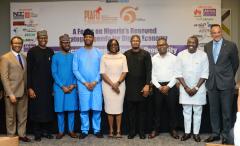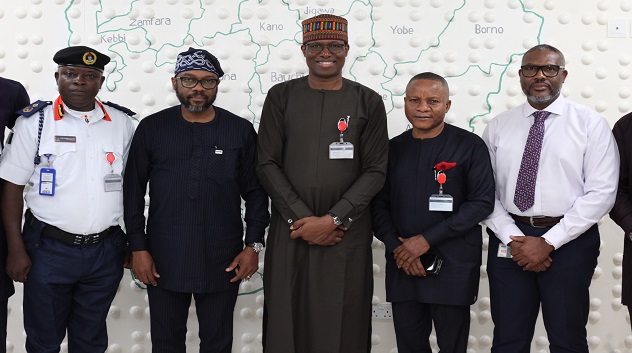Telecom
Stakeholders @PIAFo Identify Obstacles to FG’s 90,000km Fibre Project

Stakeholders in the telecommunications industry have said the Federal Government’s plan to deploy 90,000 kilometers of fibre optic cables across the country will face several obstacles, especially from state governments, that might truncate the project.

L—R: Executive Director, Broadbased Communications Limited, Chidi Ibisi; National Chairman, Association of Licensed Telecoms Operators of Nigeria, Engr. Gbenga Adebayo; Chief Operating Officer, WTES Projects Limited, Chidi Ajuzie; Chief Executive Officer, Skymax Integrated Networks Limited, Engr. Chidi Charles Agukwe; Deputy Director, Policy, Competition and Economic Analyses, Nigerian Communications Commission, Mrs. Freda Bruce-Bennett; the Convener of Policy Implementation Assisted Forum (PIAFo), Mr. Omobayo Azeez; Lucky Anumaka, Manager, Managed Services and Operations, Zora Communications Limited; Co-founder/Executive Director, Infratel Africa, Dr. Tola Yusuf; and the Chief Executive Officer, Open Access Data Centre, Dr. Atotunde Coker at the sixth edition of PIAFo on Digital Economy held on Wednesday in Lagos.
According to them, without addressing the current issue of Right of Way charges, multiple taxation, and levies, which are under the control of state governments, the project which is to be implemented through a Special Purpose Vehicle (SPV) would be an exercise in futility.
The stakeholders, who spoke during the Sixth Edition of the Policy Implementation Assisted Forum (PIAFO) in Lagos on Wednesday, which was a focus on Nigeria’s renewed strategic agenda for digital economy.
They stressed the need to ensure the successful implementation of the project which was announced recently by the Federal Government to complement existing connectivity for universal access to the internet across Nigeria and provide the Nigerian digital economy with the backbone infrastructure it needed.
Addressing the obstacles
Presenting a paper on the topic, ‘Harmonizing Nigeria’s Fibre Deployment Strategies for Effective Implementation’, Executive Director of Broadbased Communications, Mr. Chidi Ibisi, said while the government’s SPV initiative is a good plan that could help the country bridge its current digital infrastructure gap, the government would need to address current challenges.
“The issues of high cost of Right of Way (RoW), destruction of fiber by road construction companies and vandals all need to be addressed for this new SPV initiative to be successful,” he said.
Highlighting some of the challenges telecom operators face when deploying infrastructure, the Group Chief Operating Officer of WTES Projects Limited, Mr. Chidi Ajuzie, said the biggest challenge to fibre cable laying in Nigeria is the informal RoW by hoodlums in states.
“For states, a formal right of way is set and some states are adopting it but the informal side of the right of way is where the complexity has come today.
“If I’m trying to lay fibre in some communities here in Lagos, the first thing that happens is the so-called land owners (omo onile) come out and a different set of people will keep coming from one street to another and they charge you. How do we achieve adequate broadband infrastructure in this kind of situation?” he said.
Role of state governments
According to the Chairman of the Association of Licensed Telecommunications Operators of Nigeria (ALTON) Engr. Gbenga Adebayo, for the 90,000 kilometres fibre project to succeed, the state governments have to take ownership.
“For the project to succeed, I think the governments at sub-nationals should take ownership. This issue of state governments seeing right of way as IGR should be a thing of the past. We can’t talk about the digital economy on one side and the government is seeing those who provide the services as sources of revenue.
“The government has always come up with good policies, but the implantation, particularly when they are tested far afield, is the biggest problem. Governors will go to Abuja and say ‘in my state, I will give the right of way free of charge.’
“When you go to such a state, they may give you the right of way for zero or one Naira, but they will give you developmental levy, education levy, state impact levy, ecosystem levy. When you add all of these together, it is more than the right of way charges. So, who is playing who?” he said.
Making vital contributions at the forum, Dr. Ayotunde Coker, the Chief Executive Officer of Open Access Data Centre (OADC) stressed the need for the fibre project to be executed by the private sector even as the World Bank is expected to fund it with up to $3 billion.
He said: “the World Bank can put money into the government but it needs private sector partnerships as the execution engine and that’s what we’ve been pushing in Africa.
“The key thing is that when the World Bank puts the money in, it should engage the private sector, figure out the policies that it needs to do and enable the private sector to execute them effectively and make it as open as possible. With that, they can achieve what they are trying to achieve.”
He further stressed that for the success of the project, Nigeria should learn lessons of what didn’t work in the past, to achieve the new broadband penetration targets with the fibre range that is required.
“Meaningful broadband is what we need, rather than just a huge set of megabits per second implementation. We need superhighway fibres. We need the distribution of these backbone that allows us then to fan out.”
He further urged state governors to be part of the project by providing an enabling environment for infrastructure roll-out, adding: “if you are a state governor and didn’t participate in it, the state won’t grow and it’s going to impact your state.”
Earlier in his opening address, the convener of PIAFo, Mr. Omobayo Azeez, said the conference was to create a midpoint dialogue platform for digital economy stakeholders across both the public and private divides to brainstorm, exchange perspectives, clear grey areas, harmonize thoughts and create a sense of collective responsibility towards accelerating our collective prosperity through technical efficiency.
The event focused on Nigeria’s renewed strategic agenda for digital economy. According to him, the new digital economy blueprint of the federal government does not only sustain existing policy directions and targets, “it also challenges us on the possibilities of attaining new frontiers with a view to “Accelerating Our Collective Prosperity through Technical Efficiency” which is the theme of the summit.
Telecom
IHS Nigeria Hosts Telecom Industry Stakeholders to Discuss Protection of Critical National Infrastructure in Lagos State

IHS Nigeria, part of the IHS Holding Limited (NYSE: IHS) (“IHS Towers”) group, one of the largest independent owners, operators, and developers of shared communications infrastructure in the world by tower count, recently hosted a high-level meeting of stakeholders in the telecommunications industry including regulators and law enforcement agencies, at its corporate headquarters in Lagos.

The meeting was organized to develop a multi-stakeholder action plan for the protection of Critical National Information Infrastructure (CNII) assets in Lagos state.
Recognizing the importance of communications infrastructure as the backbone of national security, economic growth and social cohesion, the stakeholders at the meeting convened under the umbrella of the Association of Licensed Telecoms Operators of Nigeria (ALTON) agreed on the urgent need for collaborative solutions to ensure the protection of these vital assets.
The meeting was attended by senior representatives from the telecommunications stakeholder groups and regulatory bodies including the Nigerian Communications Commission (NCC), the Association of Licensed Telecoms Operators of Nigeria (ALTON), Association of Telecommunications Companies of Nigeria (ATCON) and the Lagos State Infrastructure Maintenance and Regulatory Agency (LASIMRA).
Also in attendance were representatives from the Mobile Network Operators (MNOs), and InfraCos as well as the Nigeria Security and Civil Defence Corps (NSCDC), the security agency tasked with the protection of Critical National Infrastructure across the country.
Following extensive deliberations, the stakeholders resolved to establish a working group dedicated to addressing key industry challenges, including the vandalization and theft of telecommunications infrastructure, arbitrary shutdown of base stations, fiber cuts due to road construction and the denial of access by unauthorized individuals by leveraging technology for real-time monitoring and protection, strengthening security measures around telecommunication sites and collaborating more with the security and regulatory agencies to mitigate these challenges.
The stakeholders underscored the need to prioritize deterrence and prevention of these incidents and highlighted the importance of public awareness campaigns to sensitize the host communities and public of the need to protect telecommunications infrastructure in their localities.
Dapo Otunla, Senior Vice President & Chief Corporate Services Officer of IHS Nigeria, commented, “The protection of Critical National Information Infrastructure (CNII) has been a critical concern for all industry stakeholders.
“We are experiencing daily losses of assets, which significantly impact on the quality of service delivered to subscribers. Addressing these issues is paramount to sustaining Nigeria’s digital ecosystem and meeting regulatory expectations.”
Telecom
MTN Champs Continental Relays: Over 1,000 Athletes Gear Up for Lagos Showcase

Over 1ooo athletes are already set to participate in the upcoming MTN Champs Continental Relays, taking place between April 9 and April 12 at the UNILAG and Yabatech Sports complexes. Organisers anticipate even more registrations before the April 2 deadline.

MTN Champs is Nigeria’s largest grassroots sports competition, a collaboration between MTN Nigeria and Making of Champs (MoC), providing a platform for young athletes to showcase their talents and potentially represent Nigeria on the global stage.
Osaze Ebueku, Senior Manager, Go-to-Market at MTN Nigeria at the opening ceremony of the MTN Champs Classics events in Benin had emphasised the long-term vision behind MTN Champs: “We’re building future Olympians for Nigeria. MTN Champs is about more than competition. It’s about changing lives.”
The continental relays mark the second leg of the MTN Champs Season 3, following the Classics competition in Benin, which saw 4,371 event entries from 2,056 athletes.
As of March 24, the Lagos leg had already recorded 2,821 event entries across different age categories, highlighting the growing enthusiasm around the competition.
The registered athletes are spread across four categories, with 174 in the Cadet (U-14) category, 388 in Youth (U-17), 270 in Junior (U-20), and 279 in the Senior category.
To ensure smooth participation, organisers have outlined important guidelines. Athletes in the Cadet, Youth, and Junior categories must submit a signed Parental Consent Form, while all registered schools and athletes must collect their competition bibs by April 8 at the competition venue to confirm their participation and secure their place on the start list.
Sports enthusiasts can look forward to an electrifying showcase of emerging talent, as young athletes seize the opportunity to prove their skills on a professional stage.
Telecom
Again, Labour Fumes, Threatens Shutdown of Telcos over Non-Implementation of 15 Percent Tariff Reduction

Nigeria Labour Congress (NLC) is threatening to shut down operations of telecommunications companies over their refusal to comment on the 15 percent reduction in telecom tariffs.

Recall that that organised labour, through the NLC, forced the federal government and NCC to reduce the telecommunications tariff hike from 50% to 35% after threatening to shut down telecom operations and the NCC in response to what it saw as exploitative economic policies amidst excruciating suffering, hardship, and deepening poverty.
The government had previously formed a 10-member committee, consisting of five government and NLC representatives, to deliberate on the thorny topic of tariff hikes within two weeks and report back before making a final decision on the new telecom tariff structure.
Consequently, on Friday, February 21, 2025, the committee, at a meeting conducted in the office of the National Security Adviser (NSA) that lasted nearly three hours, decided on a 15 per cent tariff cut.
According to reports, in accordance with the conditions of the agreement, an official communiqué announcing the tariff reduction was scheduled to be released on Saturday, February 22.
According to Chronicle,iIt was said that the meeting began at 4:00 p.m. and concluded around 7:00 p.m., during which NLC representatives insisted that the tariff hike be withdrawn.
According to sources, after significant pressure from NLC representatives in the 10-man committee, the government and NCC gave up and agreed on the 15% decrease, which the government or NCC should have announced the next day.
However, at the time of this report, no such announcement has been made.
Leaders of the labour union are not taking the government’s failure to announce or implement the 15% tariff decrease lightly, suspecting that they have been duped.
The Labour leaders have therefore resolved to directly confront the NCC and telecommunications operators next week.
Though it has been reported that the date for the start of the industrial action against the NCC and telecom providers has been set and mobilisation is underway, the information is being closely guarded.
One of the leaders of the NLC stated that “We have received directives to commence mobilisation since last week. In fact, the date for the commencement of industrial action against the NCC and telecommunication operators’ offices across the country has been fixed. We have been warned not to disclose the date because the plan is to take all concerned by surprise. We are not giving any notice because we thought we had resolved this matter over a month ago. It is as if we have been scammed. Therefore, we have decided to confront the matter head-on.”
On February 12, the NLC expressed outrage over telecommunications companies’ tariff hikes, despite an earlier agreement with the Federal Government and the NCC.
According to the Labour union, “If the telecommunications companies fail to revert to the old tariff by the end of February 2025, a total shutdown of their operations nationwide will commence on March 1, 2025.”
To demonstrate its seriousness, the NLC declared that, as a first step in resisting the arbitrary tariff hike, it directed that workers and other willing citizens boycott the services of MTN, AIRTEL, and GLO daily between 11:00 a.m. and 2:00 p.m. until the end.
On Tuesday, February 11, NLC leaders issued a communiqué at the conclusion of their Central Working Committee (CWC) meeting in Lokoja, Kogi State, urging workers and citizens to suspend data purchases from telecommunications companies, which have also become one of their most effective tools for exploiting Nigerian citizens.
The communiqué, signed by Joe Ajaero and Emma Ugboaja, Congress’ President and General Secretary, respectively, instructed NLC State Councils and industrial union affiliates to quickly sensitise and mobilise their members and the general public in their jurisdictions.

 News3 days ago
News3 days agoCourt Throws Out Falana’s Fraud Case against Ekeh, Zinox Boss and Others

 E-Financial3 days ago
E-Financial3 days agoHeritage Bank Depositors Seek National Assembly’s Help to Recover Trapped Funds

 Telecom2 days ago
Telecom2 days agoAgain, Labour Fumes, Threatens Shutdown of Telcos over Non-Implementation of 15 Percent Tariff Reduction

 Telecom3 days ago
Telecom3 days agoNokia Unwraps 5G Gateway for Home Internet

 News3 days ago
News3 days agoFG to Halt Solar Panel Imports, Pushes for Local Manufacturing

 News3 days ago
News3 days agoFG Receives N1Bn Grant from Airtel Africa to Boost 3MTT Programme

 E-Business2 days ago
E-Business2 days agoQNET Disassociates From Fraudulent Academy in Abuja, Supports EFCC Arrest

 News2 days ago
News2 days agoNNPC Ready to Go to Capital Market for IPO- CFIO



























